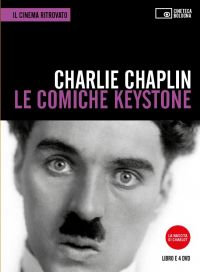Charlie Chaplin. Keystone Comedies

For the first time in a restored version, the complete collection of the 34 Keystone comedies that starred and were directed by Charlie Chaplin, produced between 2 February and 7 December 1914.
In less that twelve months Chaplin went from being an almost unknown vaudeville actor to being a star of the cinema. He learnt how to plan, direct and edit his own films: one year of whirling activity and a world began to take shape, one piece at a time a character took on a life of his own and a film-maker mastered his art in front of and behind the camera. The Keystone comedies, with an irreproducible dynamism, vitality and energy, sparked the birth and evolution of one of the most universal figures of the Twentieth century.
It took seven years of research, carried out in archives all over the world, to recover the best existing material available and allow the restoration of the entire body of work of Chaplin's Keystone comedies. This international project was initiated in 2003 by Cineteca di Bologna, the British Film Institute and Lobster Films, in collaboration with the Association Chaplin, allowing us to experience these films again today in the best possible condition with all-new musical settings.
Extras
Special bonus features: A Thief Catcher, a film, considered lost until a few months ago, in which Chaplin plays the part of a policeman. As well as: interviews with David Robinson, Chaplin's biographer, and Peter von Bagh, cinema historian, expert on the work of Chaplin and director of the Il Cinema Ritrovato Film Festival, Bologna; a rare animated film from 1916; a fascinating tour which traces some of the Keystone film locations in Los Angeles in the 1910s; a short documentary on the realisation of the restoration work and a rich gallery of unpublished photographs.
Book contents
An introduction by Gian Luca Farinelli; a Jeffrey Vance essay retracing the events of Chaplin's time with the Keystone Company; historical analysis as well as information about the restoration of each individual film; a Cecilia Cenciarelli essay exploring the different phases of Italian distribution of Chaplin's films throughout the 1910s and the 1920s.











